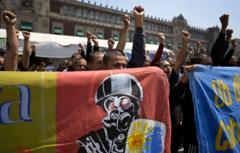This website uses cookies so that we can provide you with the best user experience possible. Cookie information is stored in your browser and performs functions such as recognising you when you return to our website and helping our team to understand which sections of the website you find most interesting and useful.


Twenty-six policer officers were injured in Mexico City on Monday in clashes with protesters who threw firecrackers.
The protesters were taking part in a demonstration demanding justice for 43 students who disappeared in 2014 from the town of Ayotzinapa in southern Guerrero state.
They were angry at the release from pre-trial detention last week of eight soldiers suspected of involvement in the students' disappearance.
The disappearance of the 43 and the botched investigation into it has long incensed not just their families but also human rights activists in Mexico and abroad.
City officials said that 26 officers had sustained injuries from the firecrackers, including to their arms, legs and buttocks and had been taken to hospital for treatment.
The protesters dispersed after the altercation.
It is not the first time demonstrators have gathered at the Zócalo - the central square in the capital - to draw attention to the lack of progress in bringing those behind the students' disappearance to justice.
In March, a group broke down one of the doors of the presidential palace with a lorry, reportedly venting their anger at not having been received by the president, Andrés Manuel López Obrador.
Solving the case was one of President López Obrador's campaign promises but almost six years on from his election win, there has been little progress made in the case.
The 43 men, all of whom attended an all-male teacher training college in Ayotzinapa, went missing on 26 September 2014 as they returned from a protest.
Despite several investigations, only the remains of three of the 43 have been found.
The whereabouts of the remaining 40 are unknown and while some of their relatives still hope to find them alive, they are widely presumed to be dead.
Two years ago, Mexico's under secretary for human rights, Alejandro Encinas, said that local, state and federal officials had been involved in the students' disappearance and called it a "state crime".
He said that the government at the time of their disappearance had tried to cover up those links.
He also concluded that there was "no indication the students are alive".
However, Mr Encinas's 2022 report has come under criticism from the families of the disappeared.
The families say that the presidential commission led by Mr Encinas failed to look into military intelligence documents which the relatives think contain information which could shed light on the case.
The military has denied such documents exist.
The families and rights activists have held regular protests to keep up pressure on the government to solve the crime.
The release from pre-trial detention of eight soldiers suspected of involvement in the case on Thursday incensed those demanding justice for the 43, who fear the eight could flee if they are not behind bars.
Prosecutors say the eight were on patrol in the area where the students went missing on the night of their disappearance.
They have been charged with forced disappearance and organised crime and are required to report to court twice a month.



 Africana55 Radio
Africana55 Radio 
